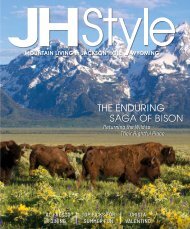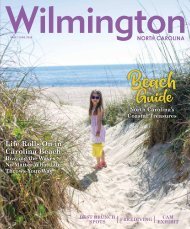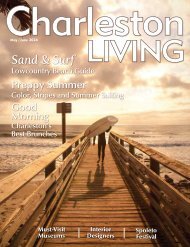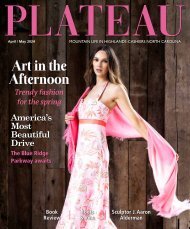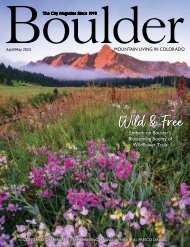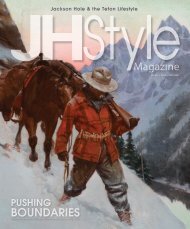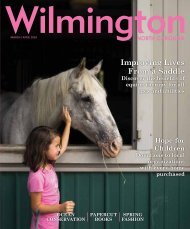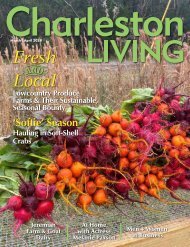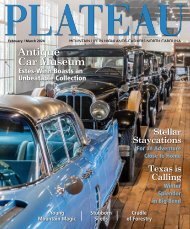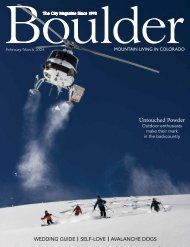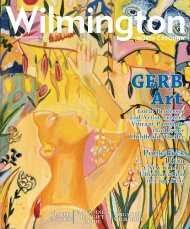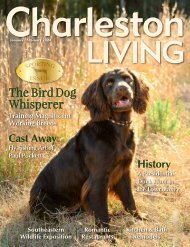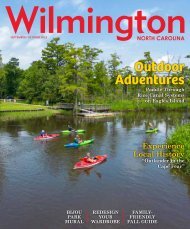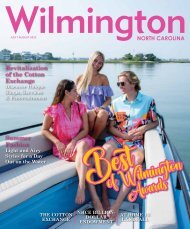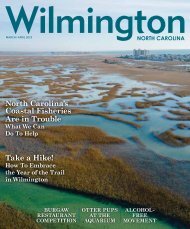Charleston Living Magazine Nov-Dec 2023
Charleston SC - The official city magazine for Charleston SC since 2012. Charleston Living Magazine is the authority on living the good life in Charleston, Mount Pleasant, Summerville, Isle of Palms, Sullivan's Island and Folly Beach, SC, showcasing homes and design, restaurants, art, fashion, business and more.
Charleston SC - The official city magazine for Charleston SC since 2012. Charleston Living Magazine is the authority on living the good life in Charleston, Mount Pleasant, Summerville, Isle of Palms, Sullivan's Island and Folly Beach, SC, showcasing homes and design, restaurants, art, fashion, business and more.
Create successful ePaper yourself
Turn your PDF publications into a flip-book with our unique Google optimized e-Paper software.
effe. It’s unusual for such a large roaster like this to dip their toes in<br />
the specialty coffee scene, but small batches yield a more flavorful cup.<br />
On average, Abby Reynolds, lead roaster, roasts 15,000 pounds of<br />
beans per day in small batches, relying on her five senses and attention<br />
to detail. As soon as beans leave the semi-truck, she roasts a few small<br />
samples to test the quality. Beans filter through feed containers into<br />
colossal roasting machines.<br />
Reynolds manipulates the energy, heat and air within these complex<br />
roasters to alter the coffee profiles and flavors. Once roasted, beans<br />
are blended immediately and then packaged for optimal freshness.<br />
Each grocery store that sells coffee opts for packages of blended or<br />
whole-bean coffee depending on their customers’ preferences.<br />
Reynolds’ favorite blend is Espresso Medium, also known as the<br />
Loggerhead Sea Turtle blend—Colombian, Mexican and Guatemalan<br />
coffees are blended together in a sweet medium roast. It’s incredible as<br />
a cold brew, espresso, or in a French press.<br />
While <strong>Charleston</strong> Coffee Roasters has tossed around the idea of<br />
opening a brick-and-mortar, they are currently focused on wholesale<br />
and online sales. Follow along on Instagram at @charleston_coffee<br />
Second State Coffee<br />
Across four locations in Harleston Village, Mount Pleasant and West<br />
Ashley, Second State Coffee is on a mission to make conversations<br />
around coffee approachable for coffee connoisseurs and newcomers.<br />
Lifelong friends Jayme Scott and Ross Jett left their corporate careers<br />
in California and Capitol Hill to open the Beaufain Street location,<br />
formerly Black Tap Coffee, in February 2012. Visiting new cafes around<br />
D.C. was the highlight of Scott’s day and Jett drew inspiration from<br />
innovative shops around San Francisco and L.A.<br />
86 | <strong>Charleston</strong><strong>Living</strong>Mag.com<br />
A decorative roaster of<br />
the past on display at<br />
Big Kick Coffee.<br />
“We always fantasized about what we liked and what we'd do differently<br />
if we opened our own coffee shop,” Jett said.<br />
Two years in, the duo realized <strong>Charleston</strong> lacked a specialty-grade<br />
coffee roaster. They opened a roasting facility on James Island, creating<br />
6-10 different blends that they stock in their shops. Second State is<br />
meticulous with its roasting process, sourcing only specialty grade coffee—roasting<br />
beans from coffee crops harvested at the optimal interval<br />
of freshness. Specialty-grade coffee equates to a farm-to-table approach<br />
in a restaurant setting.<br />
In recent years, coffee processing techniques progressed beyond two<br />
basic methods.<br />
“Farmers can get very specific with what strains of yeast they inoculate<br />
their fermentation tanks with, whether or not they introduce<br />
symbiotic fruits to that tank to sway the final flavor and then how long<br />
everything marries together,” states Jett.<br />
After purchasing coffee directly from a farmer, Second State enters<br />
a process to find the right “roast curve” for each coffee. In some scenarios,<br />
roasters nail the roast curve on the first try, but it usually takes a few<br />
attempts to discover what ideal temperature and flavor works for each<br />
coffee.<br />
In 2017, they launched a second location and took over Collective<br />
Coffee Co. in Mount Pleasant. Two locations ushered a rebranding of<br />
growth, transformation and consistency, pivoting the name to Second<br />
State Coffee. Their owl logo exemplifies wakefulness, foresight and wisdom.<br />
While there are several locations, each shop does its own thing and<br />
has a unique atmosphere.<br />
In addition to four shops, Second State Coffee sells beans online<br />
and wholesale to 40 customers, providing coffee beans to local eateries<br />
like Daps Breakfast & Imbibe and Indaco. Shop menus change<br />
routinely, offering coffee beans from different regions across the globe<br />
hinging on what’s in season.<br />
Second State’s most popular blend is the Heavyweight, favored<br />
by 90% of their wholesale accounts. The Heavyweight blend features<br />
sweet chocolate notes and can hold its own or pair with cream and sugar.<br />
However, Jett favors washed Ethiopian coffees and recommends the<br />
new Worka Nenke from Gedeb, Ethiopia. Their cold brew is renowned<br />
among students, working professionals and tourists alike.<br />
While running four shops and a roaster is a lot, Second State’s<br />
founders operate on a community-focused growth mindset, always open<br />
to new opportunities. Jett loves coffee because it’s a relationship business.<br />
“You can't buy or sell coffee without getting to know people on<br />
a personal level,” he said. “In an age where personal interaction is less<br />
inherent to many professional interactions, I feel privileged to still get to<br />
conduct myself in this fashion. I truly get to be part of my community.”<br />
Follow along on Instagram at @secondstatecoffee<br />
Big Kick Coffee<br />
Fraser Young first entered the world of coffee in the 90s selling chocolate-covered<br />
coffee beans. Shortly after moving to <strong>Charleston</strong> in 2010,<br />
Young opened Big Kick Coffee in a <strong>Charleston</strong> City Market booth<br />
prior to the 476 Meeting Street location he set up shop in July <strong>2023</strong>.<br />
Big Kick Coffee’s fire-roasting techniques and quality sourcing<br />
set it apart from local competition. The James Island roasting facility<br />
and downtown shop produce over 30 fire-roasted blends from ten coffee<br />
bean origins including Honduras, Brazil, India, and Guatemala.<br />
Young grew up in Canada and first enjoyed fire-roasted coffee in<br />
the 70s.<br />
“We used to laugh and joke at the U.S. border every time we<br />
crossed. ‘Oh, this will be the last good coffee we enjoy,’” Young recalls.<br />
In the early 2000s, he said, good coffee wasn’t prevalent in America.<br />
Beans at Big Kick Coffee are small batch fire-roasted in 100-yearold,<br />
25-pound perforated drum roasters—former peanut roasters—<br />
PHOTO JENNY PETERSON



